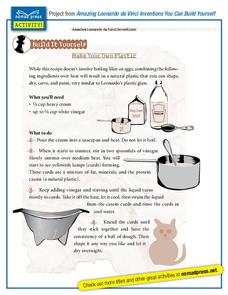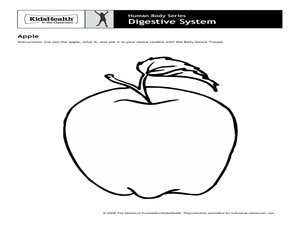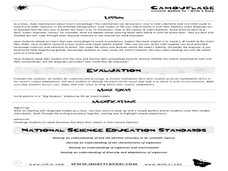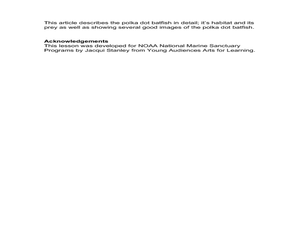Curated OER
Match Shapes in Compositions
Third graders draw shapes that are congruent with each other and identify other congruent shapes. In this congruency lesson plan, 3rd graders also apply specific colors from the color wheel in their shapes.
Nomad Press
Amazing Leonardo da Vinci Inventions: Make Your Own Plastic
When you hear Leonardo da Vinci mentioned, chances are that you think of the Mona Lisa, or flying machines—but what about plastic? Learners blend heavy cream and vinegar over heat to replicate da Vinci's early organic plastic recipe.
Curated OER
Start at the Very Beginning
Students explore ocean ecosystems. In this cross curriculum art and oceans lesson, students create a collage featuring three-finger algae using sand paper, tissue paper, and construction paper.
Curated OER
Rhythm and Art: Gesture Drawing
Students explore connections between non-verbal language and art. In this visual and auditory art lesson, students investigate the science of sound and principles of drawing. They then use various genres of music to directly apply that...
Curated OER
The Human Body
Explore the human body through hands-on activities. Young learners will trace their bodies and place cut out body organs in the proper place, print patterns using cut fruit, sing songs about good nutrition, and use their five senses...
MENSA Education & Research Foundation
Hurricanes
Learn the ins and outs of hurricanes through a series of lessons answering, "What is a hurricane? How does it travel? How is one formed, measured, and named?" Information is presented through informative text and images, while...
Curated OER
Name that animal
A great way to classify organisms, is by counting the number of legs it has or how it moves. Little ones count the legs on five different creatures, then match the leg count to the proper animal name. Tip: Have them come up with other...
DePaul University
The Working Tools of Insects
The animal kingdom is full of interesting organisms that have unique ways of surviving. Children read about different insects that have special tools for building homes and protecting themselves. When finished, learners identify the main...
Curated OER
The Art of Flying: Insects
Students study insects. They examine how insect wings operate and make a model airplane that mimics the way insect wings operate as the insect is flying. They compare and contrast different kinds of insect wings and color a page of...
Roland Park Country School
Butterfly or Moth?
What is the main difference between a moth and a butterfly? Butterflies have club-shaped antennae, while moths have a feather-like antennae. But what else differentiates these beautiful insects? The presentation in the resource...
Curated OER
The Giant Barrel Sponge
Students study barrel sponges. In this science and art lesson, students discuss what sponges are, create their own sponge, and share what they created with the rest of the class.
Curated OER
Archeologists For a Day
Learners listen to a reading about fossils and go on a hunt for items with fossil characteristics. In this cross curricular fossil lesson, students will examine their fossil finds and create a graphic organizer. Learners...
Curated OER
Human Body Series - Digestive System
With articles entitled, "What's Puke?" and "What is a Fart?" this digestive system lesson is sure to be a gas! Elementary anatomists do a belly dance to illustrate how food moves through the digestive system and then design a board game...
Curated OER
Pete And Repeat
Students draw a picture of a person from popular culture, then "clone" it using printing techniques in this Art lesson that tackles the questions surrounding cloning, DNA, and current scientific techniques. An emphasis is placed on the...
Curated OER
Line With Printmaking
Third graders investigate the use of lines in different pieces of art by creating their own ink print. In this art analysis instructional activity, 3rd graders identify the contours and lines of natural objects such as twigs and...
Curated OER
Crepe or Tissue Paper Blots
What happens when you drip vinegar onto tissue paper? The colors bleed, leaving an interesting and organic design. Get your class observing and creating with this quick-and-easy art project. Tip: This can also be done using coffee...
Curated OER
On The Go! Forces and Motion
Students create a car using physics. In this forces and motion lesson plan, students create a car and test which changes in design change the performance of the car. Students complete a graphic organizer with the different...
Curated OER
Visual Arts- Planetary Travel Brochure
Students research the planets and create a "travel brochure." In this space science lesson, students read the book Magic School Bus: Lost in Space and identify various properties of each planet. Students create a brochure for a specific...
Curated OER
Beautiful Butterfly Tiles
Third graders create a butterfly drawing that includes the elements of art and principles of design. They create artwork that can be made into ceramic tiles to be installed around the classroom doorways in our new addition.
Curated OER
Camouflage: A Study of Stealth and Survival
Students study insect camouflage. In this organisms lesson, students design and create their own 3D insect models to blend into a habitat. Students write a paragraph about the camouflage their insect has and explain how their insect is...
Curated OER
Choose Your Defense: Spines, Vomit and Camouflage
Students investigate defensive mechanisms of insects and organisms. In this biology activity, students draw imaginary caterpillars as well as imaginary parasites that will harm the caterpillar. Students utilize the Internet...
Curated OER
Metamorphosis
Young scholars select organic object and transform it to an inorganic object in five or six steps, and complete value rendered drawings.
Curated OER
Drawing Fish
Learners practice creating art by imitating the camouflage of fish. In this animal characteristic lesson, students identify certain fish and their ability to change colors in order to survive in the wild. Learners utilize coloring...
Curated OER
Climate
Learners study zoanthids. In this science and art lesson, students use line to create texture and how to use colors to create value. Learners share their beautiful mat zoanthids with the rest of the class.























